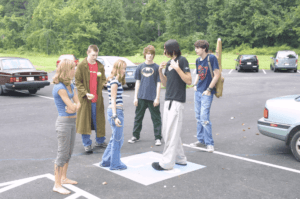Andrew Agner-Nichols

1999-2006
I think I made an attempt at attending School Meeting once or twice early on, but it took me a couple of years to become invested. I think that’s the case with a lot of people. Something would happen, hopefully not a JC referral. You don’t want to try to first become invested in School Meeting when it’s disciplinary. That’s kind of a rough situation to be in, and that’s not the ideal time to become acquainted with School Meeting. I’d say the best ways to become acquainted with School Meeting were those times when someone wants to change a rule or someone wants something to happen, and they get their group together and say, “Guys, this means a lot to me. Let’s go to School Meeting. I know we have to wait for an hour to get to it, but if we just power through, we can talk about why we want this.” We’d go in and do it. When it went our way, that gave us that rush of, “Yes, we did a thing today. We got something passed.” Other days, it didn’t quite go our way, and we’d deal with that frustration and loss and navigate that.
The transition from being a frequent defendant in JC to running the meeting was one of those periods when there was so much going on, and I was learning without realizing I was learning. I know that being a part of the prosecution kind of changed how I viewed certain things. I think it probably made me a better defendant, because I know when I would go in after that, for the most part I would be respectful, I would be quick and concise, and I would attempt not to waste time quite so much. I think we all have a major need to defend our actions, even if we know we are wrong. I wish I had gotten better at that earlier when I was here. Coming back and staffing, I have noticed that in a lot of these cases, they go to JC and they’ll need to give a reason or an excuse for why they did what they did. You don’t always need that. You can just apologize, say, “I understand what I did was wrong.” I may have reasons but they are excuses, and it’s not an excuse for what I did. That’s all you really need.

Juggling while hanging out with friends in the parking lot, 2004.
You can learn so much from someone who is just a couple of years older than you or a couple of years younger than you, or what seems like an ocean of time at that age. A ten-year-old talking to a fifteen-year-old, it feels completely different. I think it’s important for many reasons. Part of it is just being comfortable with talking to people that aren’t your age and learning how to interact with those people and learning from their actions. When I was younger and hanging out with Gabriel and a couple other people of the older age bracket, I would kind of learn these social cues and spend more time listening or observing and figuring out which of my actions were annoying and what I needed to adjust. Then, it was also nice to have them there, so if a younger person or someone of your age range was picking on you, or doing something obnoxious, you’d have a superior there to say, “Hey, that’s not cool. Back off.” This didn’t happen very often, but just having the family dynamic there was helpful.